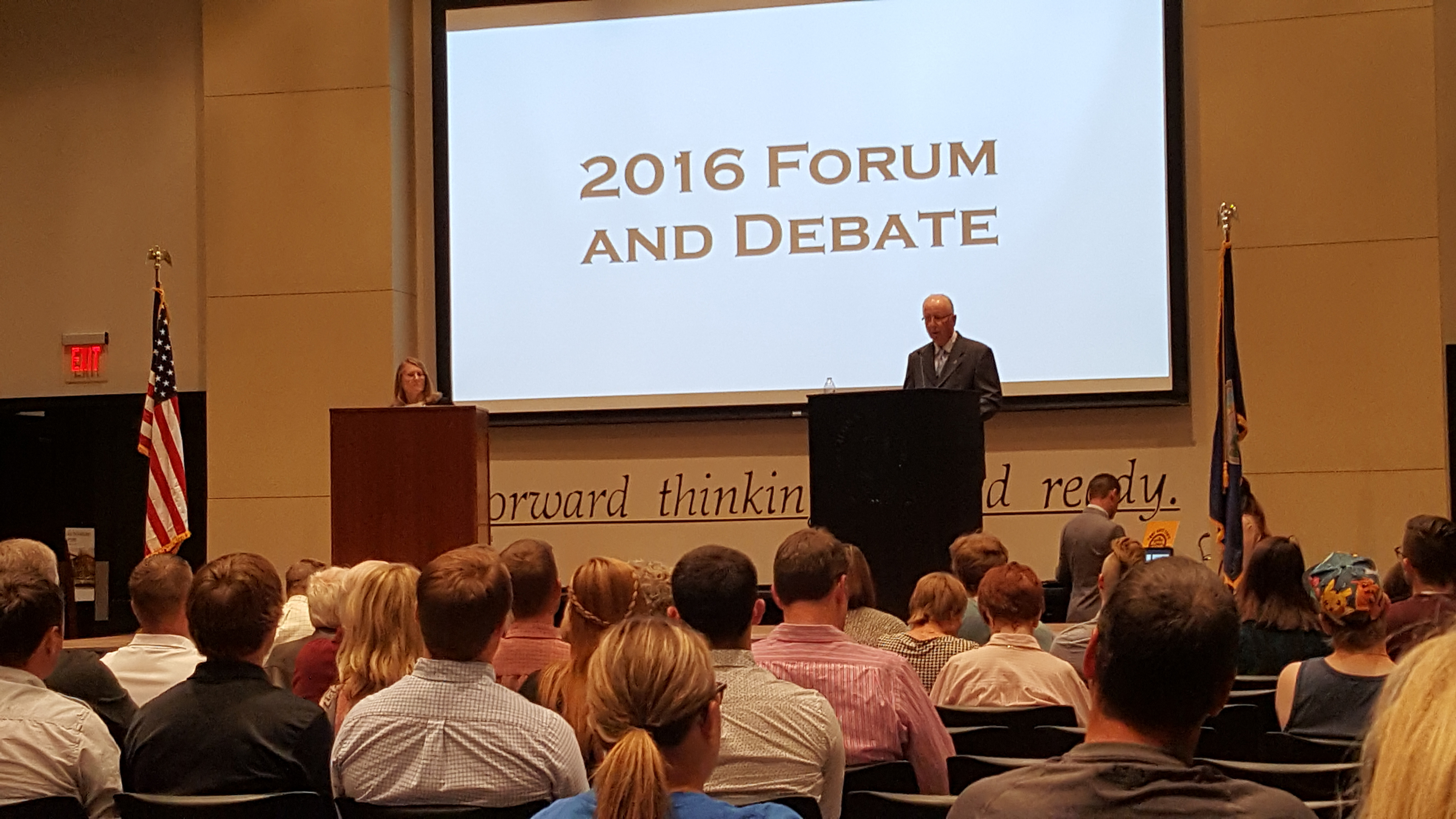
By JON ZWEYGARDT
Hays Post
The two candidates vying for the 111th seat in the Kansas House of Representatives traded barbs over their experience and the direction the state is headed during Wednesday’s debate at Fort Hays State University.
Two-term Republican incumbent Sue Boldra faced longtime Democratic former state legislator and city commissioner Eber Phelps in the debate hosted by the FHSU American Democracy Project and the Student Government Association. Both are Hays residents.
Boldra, who currently serves on three House committees, acknowledged that 2017 could be rough because of what she calls a “perfect storm” of low commodity and oil prices but she says she believes the state has a number of programs that will bounce back.
“I will work very hard, again, at getting the LLC loophole fixed in our state income tax,” said Boldra.
Under the plan passed by the legislature four years ago, owners of limited liability companies are exempt from paying taxes on business income.
Phelps, who was in the legislature when the tax plan was passed in 2012, says he believes the state cannot continue the current path under two-term Republican Governor Sam Brownback.
“I assure you that I voted in opposition to the 2012 tax plan that the governor put forth,” said Phelps, “because I seemed to have listened to the right people that told us exactly where we were going to end up.”
Phelps says its “gratifying” to hear that Boldra wants to get things back on track but says she has voted with the governor 96-percent of the time over the last four years.
Boldra questioned that number and said she failed to receive an endorsement from the Kansas Chamber of Commerce because, “I didn’t vote with Brownback enough.”
“I vote for schools. I voted to fix the LLC tax loophole. I have voted against Brownback a number of times.”
She attacked Phelps for his years working in city and state government, claiming Phelps has “taken a paycheck.”
“I am not a career politician,” said Boldra. “I’m not going to serve 16 years in the legislature nor become mayor, nor city commissioner.”
Phelps said he finds it amusing when called a career politician. He said he was paid $125 for the first six years he worked in city government and $150 over the last two years.
“If that’s a career, I need to go talk to a counselor and get into a different field,” a comment that drew laughter from the crowd.
“What have I done? My god, I was on the commission back 20 years ago when we solved our long-term water issues here in the state of Kansas by buying the R9 Ranch,” said Phelps.
He also said he was part of the commission that “created one of the most successful curbside recycling programs in the state of Kansas.”
Phelps said the previous school funding formula – scrapped by the legislature for block grants – was a very good system and not broken like many people claim.
“It’s not broken,” said Phelps “It’s just not funded.”
Boldra said she is eager to get the opportunity to help draw up a new formula, and said the old formula was drawn up in 1992 and had its problems. Among those were Blue Valley, one of the richest districts in the state still receiving equalization funds and schools were getting paid more for online students than regular students.
She also said she would have like to have experimented with school funding using the innovative school districts because they cover a broad spectrum of schools.
With commodity prices historically low, Phelps said he hopes Kansas will once again be represented in Congress on the national level and in the agricultural committee. Kansas Congressman Tim Huelskamp was removed from the House ag committee by then-Speaker of the House John Boehner.
As a way to help local farmers, Phelps says the state needs to state investing in the comprehensive highway program.
“Our farmers, and also our oil industry, rely on great roads and we’re seeing those deteriorate,” said Phelps.
He added that would be another way to help the oil and gas industry – which is also currently dealing with low prices. He said hiring people who were laid off from the oil industry to work in upgrading roads will keep them in Western Kansas.
Boldra said they are considering allowing Kansas State University to experiment with industrial hemp which currently Kansas imports from Canada. She also praised an effort in Scott County to grow gluten-free sorghum. It is then dried out and turned into flour.
She also touted programs that are currently in place that can help bring jobs back to Kansas. Among those was JumpStart Kansas, an initiative launched this month by the Kansas Department of Commerce that will give the state’s six state universities money to help invest in business in Kansas.
“We have many opportunities in our state to grow small businesses,” said Boldra.
Both candidates agreed on expanding KanCare – Kansas’ managed health care program. KanCare is provided to all Medicaid and CHIP (Children’s Health Insurance Program) consumers.
Phelps said expanding KanCare will help plug holes in the state’s budget and he believes the state has missed out on more than $1 million.
“If we were to sign on for that,” Phelps said, “we would not be seeing a lot of the problems we’re having right now.”
Boldra said any expansion must be, at least revenue neutral for her to support expansion.
